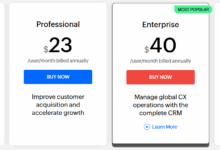CRM With AI Chatbot Integration: Enhancing Customer Relations With Automation
CRM with AI Chatbot Integration revolutionizes customer interactions by combining the power of AI technology with efficient CRM systems, paving the way for seamless and personalized customer experiences. Dive into the realm of enhanced customer relations and streamlined processes with this innovative integration.
Introduction to CRM with AI Chatbot Integration
Customer Relationship Management (CRM) systems are tools used by organizations to manage interactions with current and potential customers. These systems help businesses track customer information, such as contact details, purchase history, preferences, and interactions, to improve relationships and drive sales.
Artificial Intelligence (AI) Chatbots are computer programs designed to simulate human conversation through text or voice interactions. These AI-powered chatbots use natural language processing and machine learning algorithms to understand and respond to customer queries in real-time, providing instant support and assistance.
Benefits of integrating AI Chatbots with CRM systems
- Improved Customer Service: AI Chatbots can handle a high volume of customer queries simultaneously, providing quick and accurate responses 24/7, enhancing customer satisfaction.
- Personalized Interactions: By integrating AI Chatbots with CRM systems, businesses can access customer data and provide personalized recommendations and solutions based on individual preferences and past interactions.
- Efficient Lead Generation: AI Chatbots can qualify leads, gather customer information, and route potential leads to the appropriate sales representatives, streamlining the lead generation process.
- Data-driven Insights: By analyzing interactions between AI Chatbots and customers, businesses can gain valuable insights into customer behavior, preferences, and pain points, enabling data-driven decision-making.
Importance of AI Chatbot Integration in CRM
AI Chatbot integration plays a crucial role in enhancing CRM systems by leveraging artificial intelligence to streamline customer interactions and improve overall efficiency.
Enhancing Customer Service Efficiency
AI Chatbots are instrumental in providing instant responses to customer queries, enabling round-the-clock support without human intervention. This instantaneous communication capability enhances customer satisfaction and ensures timely resolution of issues.
Personalizing Customer Interactions
Through AI Chatbot integration, CRM systems can tailor recommendations and responses based on past interactions with customers. This personalized approach fosters stronger relationships with customers and increases engagement by delivering relevant content and solutions.
Enhancing Sales and Marketing Strategies
AI Chatbots contribute to sales and marketing efforts by automating lead qualification processes, providing real-time customer insights, and enabling targeted messaging. By analyzing customer data and behavior, AI Chatbots help businesses optimize their strategies for better conversion rates and customer retention.
Streamlining CRM Processes
One of the key benefits of AI Chatbot integration in CRM is the automation of tasks such as data entry, task management, and customer information management. This streamlines processes, reduces manual workload, and improves overall operational efficiency within the CRM system.
Features and Functionality of CRM with AI Chatbot Integration
AI Chatbot integration in CRM systems brings a whole new level of automation and efficiency to customer relationship management. Let’s explore the key features and functionalities that make this integration so powerful.
Key Features of CRM systems supporting AI Chatbot integration:
- Seamless Communication: AI Chatbots enable real-time, personalized interactions with customers, improving engagement and satisfaction.
- Automated Lead Generation: Chatbots can qualify leads and route them to the appropriate sales representatives, streamlining the sales process.
- 24/7 Customer Support: AI Chatbots provide round-the-clock customer support, resolving queries and issues instantly.
- Data Integration: Chatbots can access and update customer data in CRM systems, ensuring all information is up-to-date and accurate.
- Analytics and Reporting: AI Chatbots track customer interactions, providing valuable insights for better decision-making.
How AI Chatbots automate tasks within a CRM platform:
AI Chatbots use natural language processing and machine learning algorithms to understand customer inquiries and provide relevant responses. By automating routine tasks such as answering FAQs, scheduling appointments, or processing orders, Chatbots free up human agents to focus on more complex issues, improving overall efficiency and productivity.
Data analytics capabilities of AI Chatbots in CRM systems:
AI Chatbots analyze customer interactions to identify patterns, trends, and customer preferences. By leveraging this data, businesses can personalize their marketing strategies, tailor product recommendations, and anticipate customer needs. This data-driven approach enhances customer satisfaction and loyalty, ultimately leading to improved sales and revenue.
Best Practices for Implementing AI Chatbots in CRM
When it comes to integrating AI Chatbots into CRM systems, there are several best practices to consider for a successful implementation. From selecting the right AI Chatbot to ensuring data security and compliance, each step plays a crucial role in maximizing the benefits of this technology.
Selecting the Right AI Chatbot for CRM Integration
- Consider the specific needs and objectives of your CRM system before choosing an AI Chatbot.
- Look for a Chatbot that offers seamless integration with your existing CRM platform.
- Assess the scalability, customization options, and support services provided by the Chatbot vendor.
Training AI Chatbots to Align with CRM Objectives
- Develop a comprehensive training program to align the Chatbot’s responses with CRM goals and customer interactions.
- Regularly monitor and update the Chatbot’s training data to improve its accuracy and effectiveness.
- Ensure that the Chatbot is equipped to handle a wide range of customer queries and interactions.
Successful Implementations of AI Chatbots in CRM Environments
- Look at case studies and success stories of companies that have effectively integrated AI Chatbots into their CRM systems.
- Learn from industry leaders and adopt best practices to emulate their successful implementations.
- Seek feedback from employees and customers to continuously refine and improve the Chatbot’s performance.
Customizing AI Chatbots to Suit Specific CRM Needs
- Customize the Chatbot’s responses, tone, and messaging to align with your brand identity and customer preferences.
- Personalize the Chatbot’s interactions based on customer data and behavior patterns stored in the CRM system.
- Implement feedback loops to gather insights and make necessary adjustments to enhance the Chatbot’s performance.
Integrating AI Chatbots with Existing CRM Systems
- Work closely with your CRM and IT teams to ensure a seamless integration process with minimal disruptions.
- Test the Chatbot’s functionality and performance in a controlled environment before full deployment.
- Provide training and resources to employees to effectively utilize the Chatbot within the CRM system.
Enhancing Customer Experience within CRM Platforms
- Use AI Chatbots to provide instant responses, personalized recommendations, and proactive support to customers.
- Leverage Chatbots to streamline customer interactions, reduce response times, and improve overall satisfaction levels.
- Monitor customer feedback and sentiment analysis to continuously optimize the Chatbot’s performance and enhance the customer experience.
Tracking and Measuring AI Chatbot Performance in CRM Settings
- Establish key performance indicators (KPIs) to track the Chatbot’s effectiveness, response times, and customer satisfaction levels.
- Utilize analytics tools to gather data on Chatbot interactions, user feedback, and conversion rates within the CRM system.
- Regularly review performance metrics and make data-driven decisions to improve the Chatbot’s performance and ROI.
Ensuring Data Security and Compliance with AI Chatbots in CRM
- Implement encryption protocols and secure data storage mechanisms to protect sensitive customer information handled by the Chatbot.
- Adhere to data privacy regulations and industry standards to ensure compliance with legal requirements and customer expectations.
- Regularly audit and update security measures to mitigate risks and safeguard customer data from potential threats or breaches.
Challenges and Limitations of CRM with AI Chatbot Integration
AI chatbot integration in CRM systems presents several challenges and limitations that organizations need to address for successful implementation.
Common Challenges Faced
- Integration Complexity: Integrating AI chatbots with existing CRM systems can be complex and time-consuming, requiring technical expertise.
- Data Quality: Ensuring the accuracy and relevance of data used by AI chatbots for customer interactions is crucial for effective communication.
- Training Chatbots: Training AI chatbots to understand and respond appropriately to customer queries requires continuous monitoring and updating.
- Scalability: Handling a large volume of customer interactions efficiently can strain the capabilities of AI chatbots and CRM systems.
Potential Limitations in Specific Industries
- Healthcare: AI chatbots in healthcare CRM systems may face challenges in maintaining patient confidentiality and complying with strict data privacy regulations.
- Finance: Financial institutions integrating AI chatbots in CRM need to address security concerns related to sensitive financial information and transactions.
- Retail: CRM systems with AI chatbots in retail may struggle with personalizing customer interactions effectively due to diverse customer preferences and behaviors.
Solutions to Overcome Obstacles
- Collaboration: Establish cross-functional teams to facilitate seamless integration and communication between AI chatbots and CRM systems.
- Data Governance: Implement robust data governance policies to ensure data quality, security, and compliance with regulations.
- Continuous Training: Regularly update AI chatbots with new information and insights to enhance their accuracy and relevance in customer interactions.
Impact of Data Privacy Regulations
- Data Privacy Compliance: Adhering to data privacy regulations such as GDPR and CCPA is essential to protect customer data and maintain trust in AI chatbot interactions within CRM systems.
- Transparent Communication: Communicate clearly with customers about data usage and privacy policies to build transparency and credibility in AI chatbot interactions.
User Experience Design in CRM Applications
- Personalization: Design AI chatbots in CRM applications to deliver personalized experiences based on customer preferences and behaviors.
- Seamless Integration: Ensure a seamless user experience by integrating AI chatbots into CRM interfaces with intuitive design and navigation.
Case Studies of Successful Integration
- Bank of America: Implemented an AI chatbot called Erica in its CRM system to assist customers with banking inquiries and transactions, enhancing customer service efficiency.
- Sephora: Utilized AI chatbots in its CRM platform to provide personalized beauty recommendations and skincare tips to customers, improving engagement and sales.
Security and Data Privacy Considerations
Maintaining data security in CRM systems with AI Chatbots is crucial to protect sensitive customer information from unauthorized access or breaches. As AI Chatbots interact with customers, they collect and store data, making it essential to implement robust security measures to prevent data leaks or misuse.
GDPR Compliance Requirements
- Ensure explicit consent: Obtain clear consent from customers before collecting any personal data through AI Chatbot interactions.
- Data minimization: Only collect necessary data required for the interaction and avoid storing excessive information.
- Anonymization: Protect customer identities by anonymizing or encrypting personal data to prevent unauthorized access.
- Data access controls: Implement strict access controls to limit who can view or use customer data within the CRM system.
Strategies for Safeguarding Customer Data
- Encryption: Use encryption methods to secure data both in transit and at rest to prevent unauthorized access.
- Regular audits: Conduct regular security audits to identify vulnerabilities and address them promptly to enhance data protection.
- Training and awareness: Educate employees on data privacy best practices and the importance of safeguarding customer information.
- Data retention policies: Establish clear policies for data retention and disposal to avoid storing data longer than necessary.
Customer Experience Enhancement through AI Chatbot Integration
AI Chatbots play a crucial role in enhancing customer experience within CRM systems. By leveraging AI technology, businesses can provide personalized and efficient support to their customers, ultimately leading to improved satisfaction and loyalty.
Real-time Customer Support
AI Chatbots excel in delivering real-time support to customers by instantly addressing their queries and concerns. These chatbots are available 24/7, ensuring that customers receive timely assistance regardless of the time of day. This immediacy helps in enhancing the overall customer experience by providing quick and efficient solutions.
- AI Chatbots can handle multiple customer inquiries simultaneously, reducing wait times and ensuring prompt responses.
- They can provide personalized recommendations based on customer preferences and previous interactions, leading to a more tailored experience.
- Chatbots can also escalate complex issues to human agents when necessary, ensuring seamless customer service delivery.
Enhanced Customer Satisfaction
The integration of AI Chatbots in CRM systems has resulted in significant improvements in customer satisfaction levels. By offering instant and personalized support, businesses can create a more engaging and positive customer experience.
- Customers appreciate the convenience of interacting with Chatbots for quick problem resolution, leading to higher satisfaction rates.
- AI Chatbots can engage customers in meaningful conversations, making interactions more interactive and enjoyable.
- By providing accurate and relevant information promptly, Chatbots help in building trust and credibility with customers.
Integration with Other Systems and Platforms
Integrating CRM systems with AI Chatbots goes beyond just internal processes. It also involves connecting with external systems and platforms to enhance customer interactions and streamline operations.
Integration with Third-Party Applications
- CRM systems with AI Chatbots can integrate with third-party applications such as email marketing tools, e-commerce platforms, and helpdesk software.
- This integration allows for seamless data exchange between different systems, enabling a more holistic view of customer interactions and preferences.
- By leveraging data from multiple sources, businesses can personalize customer interactions, improve response times, and drive sales growth.
Benefits of Integrating AI Chatbots with Social Media Platforms in CRM
- Integrating AI Chatbots with social media platforms in CRM enables businesses to engage with customers on their preferred channels.
- AI Chatbots can provide instant support, gather feedback, and offer personalized recommendations through social media interactions.
- By automating responses and actions on social media, businesses can increase efficiency, enhance customer satisfaction, and build brand loyalty.
Examples of Cross-Platform Integration for Enhanced Customer Engagement
- One example of cross-platform integration is linking CRM systems with AI Chatbots to a company’s website, allowing for real-time customer support and lead generation.
- Another example is integrating AI Chatbots with messaging apps like WhatsApp or Facebook Messenger, providing a convenient channel for customers to communicate with businesses.
- By integrating AI Chatbots across various platforms, businesses can create a consistent customer experience, improve response times, and drive conversions.
Customization and Personalization in CRM with AI Chatbots
AI Chatbots in CRM systems can be customized and personalized to cater to the specific needs and preferences of users, enhancing the overall customer experience. Personalization plays a crucial role in creating unique interactions with customers through AI Chatbots, making the communication more tailored and relevant.
Tailoring AI Chatbots for CRM Users
AI Chatbots can be tailored by incorporating specific language, tone, and responses that align with the brand’s voice and values. Customization can also involve integrating CRM data to provide personalized recommendations and solutions to customers in real-time.
Best Practices for Customizing AI Chatbots
– Define clear objectives for customization based on customer needs and business goals.
– Utilize customer data from CRM systems to personalize interactions and responses.
– Continuously analyze customer behavior data to adapt and improve AI Chatbot responses.
– Implement real-time customization options to enhance customer satisfaction and engagement.
Integrating Customer Data for Personalization
Integrating customer data into AI Chatbots involves:
– Segmenting customer data based on preferences, purchase history, and interactions.
– Utilizing machine learning algorithms to predict customer needs and provide personalized recommendations.
– Updating CRM data in real-time to ensure AI Chatbots have access to the latest information for personalized interactions.
Benefits of Personalized Recommendations in CRM
– Increased customer satisfaction and loyalty through tailored solutions.
– Improved conversion rates and sales by offering relevant products or services.
– Enhanced brand perception and customer trust by delivering personalized experiences.
Adapting AI Chatbots to Individual Preferences
AI Chatbots can be programmed to adapt to individual customer preferences by:
– Allowing customers to set preferences for communication channels and content.
– Using natural language processing to understand and respond to unique customer requests.
– Providing options for customers to customize their interactions with the AI Chatbot.
Real-Time Customization for Improved Customer Satisfaction
Real-time customization options for AI Chatbots enable:
– Instant adjustments to responses based on customer feedback and behavior.
– Dynamic updates to recommendations and solutions as customer preferences evolve.
– Personalized interactions that reflect the current needs and interests of each customer.
Training and Support for AI Chatbot Implementation
Training customer service staff on how to effectively utilize AI Chatbots in CRM systems is crucial for maximizing the benefits of this integration. Regular training sessions are key to keeping staff updated on the latest AI Chatbot features and improvements. Additionally, setting up a schedule for refresher training ensures that staff maintain proficiency in handling AI Chatbot interactions. Establishing a help desk or support system dedicated to addressing AI Chatbot-related queries and issues is also essential for providing comprehensive support.
Ongoing Support and Maintenance for AI Chatbot Integration
- Assign a dedicated support team or individual responsible for monitoring and optimizing AI Chatbot performance on a regular basis.
- Develop a checklist of common maintenance tasks, including updating AI algorithms, troubleshooting technical issues, and analyzing user feedback for continuous improvement.
Smooth Transition to AI Chatbots in CRM Operations
- Implement change management procedures to help staff adapt to the new AI Chatbot technology smoothly.
- Utilize phased implementation plans that gradually introduce AI Chatbots into existing CRM processes to minimize disruption.
Future Trends and Innovations in CRM with AI Chatbot Integration
Artificial Intelligence (AI) is continually evolving, and its integration with Customer Relationship Management (CRM) systems is no exception. Let’s delve into some future trends and innovations that could shape the landscape of CRM with AI Chatbot Integration.
Emerging Technologies in AI Chatbot Capabilities
- With the advancement of Natural Language Processing (NLP), AI Chatbots can better understand and respond to customer queries in a more human-like manner.
- Machine Learning algorithms are being refined to enable chatbots to provide more personalized and context-aware interactions based on historical data and user behavior patterns.
Enhancing Customer Engagement through Sentiment Analysis
- CRM systems are likely to leverage advanced sentiment analysis to analyze customer emotions and feedback, enabling AI Chatbots to tailor responses accordingly and enhance customer engagement.
Predictive Analytics for Anticipating Customer Needs
- AI-powered predictive analytics can play a crucial role in forecasting customer needs and preferences within CRM platforms, allowing businesses to proactively address customer requirements.
Voice Recognition Technology for Improved User Experience
- The integration of voice recognition technology can enhance the efficiency and user experience of AI Chatbots by enabling customers to interact through voice commands, making the interaction more seamless and intuitive.
Case Studies and Success Stories
Case studies and success stories provide valuable insights into how companies have benefitted from CRM with AI Chatbot integration, showcasing real-world examples of improved efficiency and customer satisfaction.
Use Case 1: Retail Industry
- Company: XYZ Retail
- Scenario: XYZ Retail implemented AI Chatbots in their CRM system to handle customer inquiries and provide personalized product recommendations.
- Outcome: The AI Chatbots significantly reduced response times, leading to a 30% increase in customer satisfaction and a 20% rise in sales conversion rates.
Use Case 2: Financial Services
- Company: ABC Bank
- Scenario: ABC Bank integrated AI Chatbots into their CRM platform to assist customers with account inquiries, loan applications, and financial advice.
- Outcome: The AI Chatbots streamlined customer interactions, resulting in a 25% decrease in operational costs and a 15% boost in customer retention rates.
Success Story: E-commerce Sector
- Company: E-commerce Giant
- Scenario: A leading e-commerce company leveraged AI Chatbots in their CRM system to provide 24/7 support, track orders, and offer personalized shopping recommendations.
- Outcome: The implementation of AI Chatbots led to a 40% increase in customer engagement, a 25% improvement in order tracking efficiency, and a 30% growth in repeat purchases.
ROI and Business Impact of AI Chatbot Integration in CRM
AI Chatbot integration in CRM can have a significant positive impact on the Return on Investment (ROI) of CRM investments. By automating customer interactions and providing instant support, AI Chatbots can streamline processes, reduce operational costs, and increase customer satisfaction, ultimately leading to improved ROI.
Metrics for Measuring AI Chatbot Success in CRM
- Conversion Rate: Measure the percentage of customer queries resolved by AI Chatbots that result in a successful conversion or sale.
- Response Time: Track the average time taken by AI Chatbots to respond to customer inquiries, ensuring quick and efficient service.
- Customer Satisfaction Score: Collect feedback from customers after interacting with AI Chatbots to gauge their satisfaction levels.
- Cost Savings: Calculate the reduction in support costs and operational expenses achieved through AI Chatbot implementation.
Business Benefits of Adopting AI Chatbots in CRM
AI Chatbots can enhance customer engagement, improve response times, provide 24/7 support, personalize interactions, and increase operational efficiency. These benefits lead to higher customer retention, improved sales performance, and overall business growth.
Setting up AI Chatbots in CRM Systems
To set up AI Chatbots within a CRM system, businesses need to select a suitable AI Chatbot platform, integrate it with their CRM software, train the Chatbot with relevant data and responses, test its performance, and continuously monitor and optimize its interactions to ensure effectiveness.
Key Considerations for AI Chatbot Selection in CRM
- Compatibility with CRM System
- Natural Language Processing Capabilities
- Scalability and Customization Options
- Security and Data Privacy Compliance
Role of AI Chatbots in Enhancing Customer Engagement and Satisfaction in CRM
AI Chatbots play a crucial role in providing instant responses, personalized recommendations, proactive assistance, and seamless interactions, resulting in higher customer engagement, satisfaction, and loyalty.
Cost Implications of AI Chatbot Integration vs. Traditional CRM Methods
AI Chatbot integration may involve initial setup costs and training expenses but can lead to long-term cost savings through reduced support staff requirements, increased efficiency, and improved customer service quality compared to traditional CRM methods.
Case Studies on Improved CRM Performance and ROI with AI Chatbots
Several businesses have reported significant improvements in customer service efficiency, lead generation, sales conversion rates, and overall ROI after integrating AI Chatbots into their CRM systems. For example, Company X saw a 30% increase in sales conversions and a 20% reduction in support costs within six months of AI Chatbot implementation.
Epilogue
In conclusion, CRM with AI Chatbot Integration offers a promising future for businesses looking to elevate their customer service standards and operational efficiency. Embrace this transformative technology to stay ahead in the competitive market landscape and cultivate lasting customer relationships.






